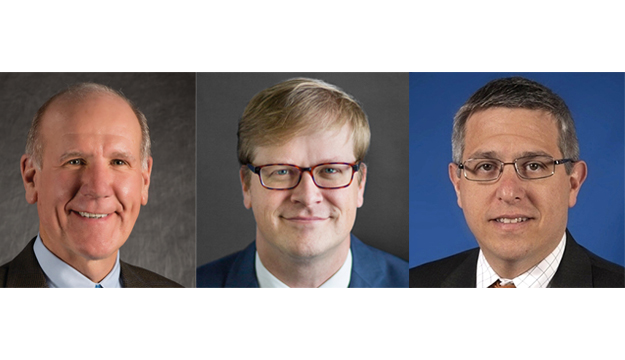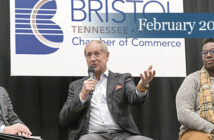Photo above: Steve Smith, Travis Staton, and Alan Levine
By Scott Robertson
The relationship between the United Way and the business community in America has generally followed a simple model: businesses support the United Way, through encouraging employees to contribute to fund drives and through allowing employees to take time away from the office to volunteer. The United Way of Southwest Virginia is adding a facet to that model. That organization is starting a focused, deliberate drive to make a positive impact on the workforce available to the business community in the region.
Because the United Way of Southwest Virginia serves 13 counties and two cities, it traditionally focuses efforts on improving the health, education, and financial stability of all people in the region. That won’t change, President and CEO Travis Staton said, but the organization will bring those efforts to bear specifically on workforce issues. “United Way of Southwest Virginia operates on an initiative-based community impact model, meaning we take a specific problem in the community and focus funding and efforts to address that problem. We foster collaborations with businesses, non-profits, and community leaders to produce more targeted, focused outcomes and measurable, long-lasting results. We understand that it takes everyone uniting for the same cause to make the most impact on our region’s workforce.”
Staton added, “While our unemployment rate continues to be the highest in the state and the need for job growth is a regional focus, the fact that so many young people are not pursuing education or entering the workforce is having far-reaching negative impacts on our region’s workforce and economic vitality.”
There is a gap between the worlds of learning and work in our region. Research from the Virginia Department of Education shows us that less than half of high school graduates in Southwest Virginia go on to further their education; according to the Annie E. Casey Foundation in 2015, in Southwest Virginia, around 3,800 16-24 year olds were not in school or working; yet employers need to fill open positions.
Steve Smith, President and CEO of K-VA-T Food Stores, which operates Food City, said, “As an employer, we experience the challenge of filling some of the job openings within our company.”
United Way of Southwest Virginia’s cradle-to-career vision concentrates resources on improving outcomes related to creating a strong workforce of the future. Public and private leadership know that cradle-to-career investments made now – with strategic programs, services, and partnerships – will positively impact the economic development of Southwest Virginia and the future workforce.
Initiatives new to United Way of Southwest Virginia in 2017 include a Careers Expo for Youth with an expected attendance of more than 4,000 students, and the Operation Tomorrow’s Workforce breakfast for area leaders in September.
Between now and the September breakfast and expo, the organization will be conducting outreach efforts throughout the region, including a series of articles to appear in The Business Journal exploring the current challenges in Southwest Virginia’s workforce. We’ll share the stories of local workers and discuss topics that specifically affect our workforce in Southwest Virginia such as local livable-wage jobs, local innovation, the value of working at an early age, the uniqueness of the community college system, and combining passion with skill, to name a few.
In September, Smith, Alan Levine, President and CEO of Mountain States Health Alliance, and Staton will convene top cross-sector leaders from the localities of Bland, Buchanan, Carroll, Dickenson, Giles, Grayson, Lee, Russell, Scott, Smyth, Tazewell, Washington, and Wise, and the cities of Galax and Norton for the Operation Tomorrow’s Workforce breakfast. The breakfast is an invitation-only event focused on bridging the gap between the worlds of learning and work, and inviting other community leaders to be a part of the solution.
Said Levine, “Steve, Travis, and I are ready to discuss the current workforce issues faced by Southwest Virginia, the power of a cradle-to-career approach, and the introduction of a new, community-changing opportunity to form actionable partnerships that will strengthen tomorrow’s workforce.”
The last article will recap the Operation Tomorrow’s Workforce breakfast, and will provide an overview of the actions being taken to bridge the gap between the worlds of learning and work in the region.
“In a few short years, today’s students will be tomorrow’s workforce,” Staton said. “We need to invest in our region’s students. If Southwest Virginia is going to thrive, we cannot allow the loss of the great potential we have in our young people — our next generation of game changers and problem solvers. As a father of four young children, I am committed to seeing our region thrive, not just for their future, but for all our children.




